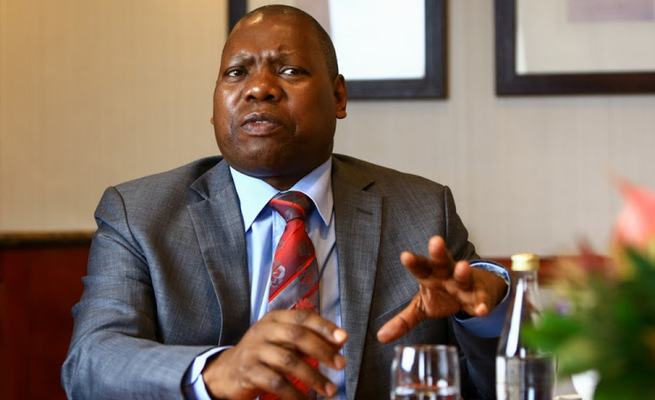Zweli Mkhize in hot soup after secretly diverting funds to pay for Jacob Zuma’s legal fees
Zweli Mkhize in hot soup after secretly diverting funds to pay for Jacob Zuma’s legal fees

Zweli Mkhize said to have played a key role in diverting funds to pay former • statesman’s legal fees Windfall could not be disclosed for fear of political backlash
As former president Jacob Zuma scrambles to pay his legal fees, Sunday World can reveal that millions of rand were in 2005 suspiciously transferred from state-owned Ithala Bank to pay the former statesman’s defence team in the arms deal court matter.
Documents in our possession also show that part of the sum of R3.4-million taken from Ithala, which was disguised as a loan, was used to renovate a plush house in which Zuma lived after he was fired by former president Thabo Mbeki.
The windfall was paid around August 2005 by the Kwazulu-natal government-owned bank to Hola Recruitment and Selection Services, a company owned by Zuma’s former confidante and former ANC MP Sizani Dlamini-dubazana.
Dlamini-dubazana acted as a conduit to get a loan from Ithala to pay for Zuma’s legal fees. The money was also used to rent a R3.6-million house for him in the northern Joburg suburb of Forest Town.
In terms of section 3 of the Kwazulu-natal Ithala Development Finance Corporation Act, the bank’s mandate is “to mobilise financial resources and to provide financial and supportive services to the people of Kwazulu-natal”. It is wholly owned by the provincial government.
In an explosive affidavit deposed at Norwood police station last month, Dlamini-dubazana said then MEC for finance and economic development Zweli Mkhize approached her asking that she use her company to receive a loan from Ithala to be used to fund Zuma’s legal fees.
Mkhize is currently the country’s health minister.
“He [Mkhize] informed me that money was needed to pay the legal fees of the then deputy president Mr Jacob Zuma. These funds were needed because the advocate of Mr Zuma, in his trial case, advised that if he was not paid the outstanding fees, he would not be appearing in court on the next occasion that it was due to be heard,” she said.
“He advised me that for political reasons, the loan could not be made directly to him or to Mr Zuma, but had to be made payable to a third party. He requested if he could use one of my companies for this purpose. I agreed.”
Dlamini-dubazana claims that when an amount of R3.4-million was deposited into her company from Ithala, she deposited R2.1-million into the trust account of then Zuma’s long-time attorney, Michael Hulley, and used the balance to renovate and furnish the Forest Town house she had rented to Zuma.
“Obviously, the furnisher was to be tastefully and expensively acquired in keeping with his position. I furnished the property to his liking and, in fact, I paid for the additional costs of the furnisher when the money paid to Hola had been used up,” she said.
Sunday World has seen communication between Dlamini-dubazana and Ithala regarding the loan, for which she maintained she never signed an agreement.
Ithala has since secured a bond over Dlamini-dubazana’s other property in downtown Joburg on the basis that the balance on the loan was now sitting at R7-million due to interest.
Dlamini-dubazana said it was always her understanding, even when she met Ithala officials in 2018 and before, that “for political reasons, the above report of events [surrounding the acquisition of the Ithala funds] could not be disclosed without severe political repercussions”.
According to evidence seen by Sunday World, the plan to finance the Forest Town house and the Ithala loan hinged on Zuma’s nephew, Khulubuse Zuma, securing finance to the tune of R7.5-million.
In terms of the agreement, which was confirmed by Hulley in July 2009, an amount of R3.6-million was going to be paid for bond cancellation of the house; R800 000 for outstanding rates and taxes; R2.6-million for the Ithala Bank loan (on the assumption that it was going to be negotiated to a lesser amount); and R500 000 residue to seller (Dlamini-dubazana).
In her November affidavit to the Zondo Commission of Inquiry into State Capture, Dlamini-dubazana noted that Khulubuse had not raised the money and the bond was still not settled.
Sunday World reported that the Zondo Commission investigators were probing the circumstances under which Zuma ended up living in Forest Town.
Dlamini-dubazana said that Mkhize and Khulubuse requested her to allow the former president to rent the R3.6-million property in June 2005.
Dlamini-dubazana used Hola to acquire a bond from Absa for the property, in which some of Zuma’s family members still live despite a court application for them to vacate.
Mkhize’s media liaison officer, Lwazi Manzi, had not responded to written questions sent on April 29. On Friday, Manzi committed she would alert the minister to the enquiry.
The department’s spokesperson, Popo Maja, did not respond to written questions. Repeated attempts to get comment from Khulubuse and Zuma’s spokesperson, Vukile Mathabela, and Hulley were unsuccessful.
Ithala’s Sitandiwe Mayeza also did not respond to written questions despite acknowledging them two weeks ago.
In July 2018, Zuma fired Hulley for reasons that have not yet been disclosed. In April last year, Zuma also sacked his lawyer Daniel Mantsha.
The latest legal team to be shown the door by Zuma comprised advocates Muzi Sikhakhane (SC) and Thabani Masuku (SC), whom he dropped last month. Zuma this week filed a special plea to eject advocate Billy Downer as the lead prosecutor to try him.
Comments are closed.